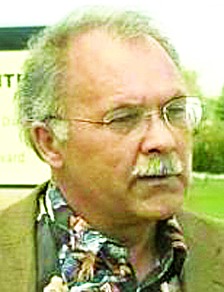Advocate: Victims Should Come First
By Jodelle Greiner
Schwiderski praised the child, who told a trusted adult; the adult who immediately contacted police; and law enforcement, prosecutors and other officials who tackled the case so quickly. "Silence is not golden when it comes to child abuse," he said. "Silence is deadly when it comes to child abuse." Schwiderski was a child in Hector when he was abused by a Catholic priest, and he wasn't the only one. He is critical of the Catholic Church, which moved the priests around instead of disciplining them, he said, and of the conspiracy of silence in the community that allowed the priests to continue to abuse. "I know hundreds of people who were slapped [when they tried to report abuse.] 'Don't talk about a priest that way,'" he said. "They protect the abusers, and children are continually sexually abused." Schwiderski says protecting children should be paramount. "Understand the language of a child," he said. "If they are saying something, pay attention." Be aware of the environment and who is in that child's world, he advises. "If you have some idiot that wants to take the kids into a private room, get rid of that idiot now," he said. "Observe, be aware, report or question." It's best if abuse is discovered and treated as quickly as possible, otherwise the victim is subject to other problems and may not realize it stems from the abuse. All survivors face common denominators, Schwiderski said: alcohol and drug abuse, post-traumatic stress disorder, and others. He has even known abused people who committed suicide. There are other individual reactions as well, for good and for bad. "This is where I'm somewhat different," Schwiderski said. "I myself am not burdened with shame and guilt and many of the other confusions." That doesn't mean he walked away unscathed. Schwiderski married and had children, but didn't tell his family about being abused. His family wondered why he did some things. "Back in the days when my three children were young, I did not give my kids a bath," which caused "arguments between me and their mother," he said. "Another dynamic that I had to address: I didn't hug much," he admitted. "I did a sideways hug; a frontal hug I did not do." His children questioned why other kids got hugs from their fathers and they didn't. He calls his children "the other victims of sexual abuse. They didn't benefit from a good loving mother and father." Schwiderski did not connect his past abuse to his problems in the present until he ran into trouble. "I was 43 years old when I stepped from the shadows of silence," he said. "Got my second DWI. [I thought], 'Jeepers, I need to get help.' When I was in treatment, I mentioned [the abuse]." His counselors quickly made the connection that his alcohol problem was a result of his sexual abuse and Schwiderski became an advocate for other survivors. He is grateful that Minnesota passed the Child Victims Act this year, eliminating the time limit for survivors to take civil action against their abusers. "Our criminal laws today are well-written in Minnesota. Now the Minnesota Child Victims Law has just passed, Minnesota has one of the better civil laws. Those two laws working in tandem gives Minnesotans the tools to fight the strongest social sickness," Schwiderski said. "Now, it's a matter of those who have been damaged by sexual abuse to seek help," he said. People are more educated now about what sexual abuse is and are more likely to report it, Schwiderski said. The latest report in 2005 stated 17,562 reported sexual violence. "That's male and female," he said. But he knows the actual number of victims is higher because most do not report abuse. He thinks part of the reason is the misconceptions about abuse survivors. "Society says if you're abused as a little boy, you grow up to be abuser. It's a shame that false wives tale is out there," he said. "The other one is little boys, if not abusers, grow up to be gay. That keeps many, many men silent. "I'm hoping as we move forward in time, those fallacies will go away." The truth, he said, is that survivors of abuse go to extremes, like he did, "to be super vigilant to protect children or they go into professions that protect children." He wants abuse survivors to know they are not alone. "I'll take any call," he said. "I try to empower them by trying to get them to file a police report," he said. "Even if the abuse happened 20 years ago, file a police report." Reporting abuse is important because the abuser could still be a risk to children. Reporting can help police build a stronger case against an abuser, especially if there are multiple victims. "The victim is now empowered; they have stepped from the shadows of silence. They are starting the road to heal and recovery," he said. "We're not going to stop crime or injury if we are silent; [we] cannot protect children or the parish if we are silent; can't educate people if you stay silent," he said. "Take the tape off your mouth; do not be afraid to report." For more information, visit snapnetwork.org
|
.
Any original material on these pages is copyright © BishopAccountability.org 2004. Reproduce freely with attribution.
